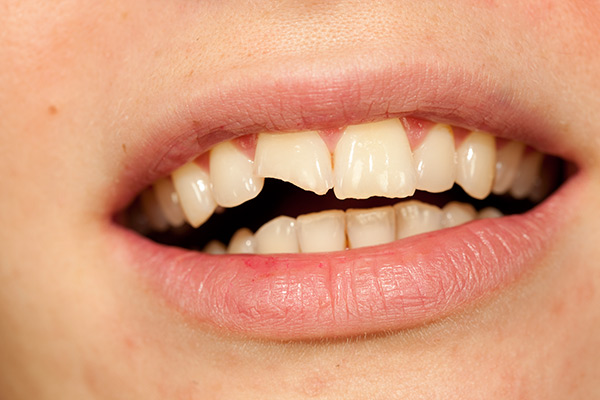
Your teeth are the hardest part in your body – even harder than bone! But like bones, they’re not impervious to damage. Coating each tooth is a layer of enamel that helps keep the more sensitive parts of your teeth protected from bacteria and decay. But when you experience a chipped tooth or cracked tooth enamel, your teeth become vulnerable.
The ways you can crack your teeth are endless. Injury isn’t the only cause, either! It may come as a surprise, but you can cause damage to your teeth with some common behaviors that most of us do every day.
Avoiding the Most Common Causes of Cracked Teeth & Enamel
Cracked tooth enamel and small chips are very common dental injuries. Accidents and injuries aren’t the only way to damage your teeth, either! Here are some of the most likely ways you may crack your teeth and how to avoid them:
Address Issues with Teeth Grinding
While you may think of cracked teeth as the result of an impact, chronic teeth grinding is one of the more common causes. Whether it’s stress or bruxism that causes your teeth to grind, the damage to your enamel can be serious.
Any time your teeth grind together, you wear away at the enamel that covers the surface. Without it, your teeth are more susceptible to decay. The weakened enamel even increases your chance to chip your tooth with further grinding or injury!
If you think you’re unconsciously grinding your teeth, schedule an appointment with Pointe Dental Group to find out about your options to protect your dental health!
Quit Using Your Teeth as Tools
Will you do anything to get all the groceries inside in one trip, including holding a bag with your teeth? Do you often open bags or bottles with your teeth? While your teeth may seem handy, they are not designed to be used as tools.
Bottles or other hard objects can directly chip your teeth. Carrying bags in your teeth causes you to clench and grind.
Take that second trip, or find a bottle opener. The long-term damage to your teeth isn’t worth the few seconds you’ll save now.
Be Careful with Tongue Piercings
Piercings are becoming increasingly popular, and tongue piercings are not an exception. Any piercing in your mouth comes with inherent risks – after all, there’s plenty of bacteria. But infection isn’t your only worry.
Most tongue piercings are metal. If your piercing comes in consistent contact with your teeth, it can cause damage. Accidental contact is hard to avoid – but most people with piercings tend to play with them.
If you have a piercing, keep it from touching your teeth as much as possible. Don’t click it or bite it. Even if it’s not metal, it can cause damage.
Biting Down on Hard Foods & Objects
Metal isn’t the only object that can hurt your teeth. Some common foods contain pits, kernels or bones that shouldn’t be bitten. They’re not just uncomfortable to bite down on, they can cause permanent enamel damage. Some of the most common offenders are:
- Hard candy
- Chicken or steak bones
- Popcorn kernels
- Olive, avocado or fruit pits
- Ice cubes
- Pens and pencils
Do your best to avoid chewing these, and be careful when eating any food that contains hard, inedible objects like bones.
Athletic Injuries
Unsurprisingly, playing sports puts you at greater risk for injuries – including dental ones. What is surprising, however, is that non-contact sports account for a significant number of chipped or broken teeth. This includes sports like basketball, soccer and baseball.
Why? Because they don’t require mouth guards. Accidental contact is common. Because it’s not part of the game, many athletes won’t wear mouth protection. This means one collision or fall onto the hard ground can do major damage.
Even if your sport is non-contact, wear a mouth guard. Pointe Dental Group can fit a custom mouth guard for you at both our Shelby Township and Grosse Pointe Farms locations. These fit more comfortably and offer far better protection than store-bought mouth guards.
How to Identify a Cracked Tooth
Do you think you may have cracked tooth enamel? If you do, you likely have one of these symptoms:
- Sensitivity to touch
- Extreme sensitivity to hot or cold
- Pain when biting or chewing
If the pain is constant, it may not be a cracked tooth. When you crack a tooth, you typically only feel pain when the nerves are contacted by food or water. Either way, a quick trip to your dentist can help you identify the source of your pain!
Treatment Options for Cracked Teeth & Tooth Enamel
The treatment options for a cracked tooth or cracked tooth enamel are varied. They often depend on the severity of the damage.
Dental Bonding
For minor chips or cracks, dental bonding is an option. Bonding is a procedure that uses a special composite to repair gaps or chips in your teeth. With proper care, bonding can last up to 10 years! This option is relatively simple, and only requires anesthetic if applied to a cavity.
Veneers
Small cracks or chips can be repaired using a thin laminate that bonds directly to your teeth known as a veneer. Often used as a cosmetic fix for discolored teeth or to close gaps, they are easy for your dentist to apply and can dramatically improve the appearance of your teeth.
The lifespan of a veneer depends on how well you take care of it. However, you’ll eventually need to replace the veneer no matter what. With excellent care, you can expect to have your veneer last for several years.
Crowns
When your tooth is more damaged than a minor chip, you will likely need a crown. They’re the most common treatment for cracked teeth.
These caps cover your damaged tooth and are cemented into place. In addition to protecting the tooth, they also help improve the appearance. Most crowns are made of tooth-colored materials like porcelain to give an appearance and feel like your natural teeth.
Root Canal
A cracked tooth sometimes extends all the way to the pulp of your tooth. If this happens, you’ll need a root canal procedure. Your dentist will drill into your tooth to remove pulp and the nerve. After sealing the tooth, you’ll typically have a crown placed to help maintain the integrity of the tooth.
It’s not uncommon for patients to be afraid of a root canal. Unlike what you may have heard, a root canal shouldn’t hurt at all. Modern dental practices and the use of local anesthetic means that the procedure will be as painless as most other visits.
Dental Implants
In some cases, even a root canal isn’t enough to salvage a tooth. If you suffer a cracked tooth that extends below the gum line, there’s nothing that can be done to save it. In this case, your dentist will recommend an extraction and dental implant.
Implants replace your tooth completely. They look and feel like natural teeth and are a great solution to missing teeth.
Find the answers to frequently asked questions about dental implants here.
Do You Have a Cracked Tooth? Schedule an Appointment!
The dental professionals at Pointe Dental Group can examine your tooth and recommend the best treatment option for you. Schedule an appointment with our dentists in today!
Grosse Pointe Farms: (313) 881-2480
Shelby Township: (586) 803-8300
Don’t miss a thing! Connect with us on Facebook.
